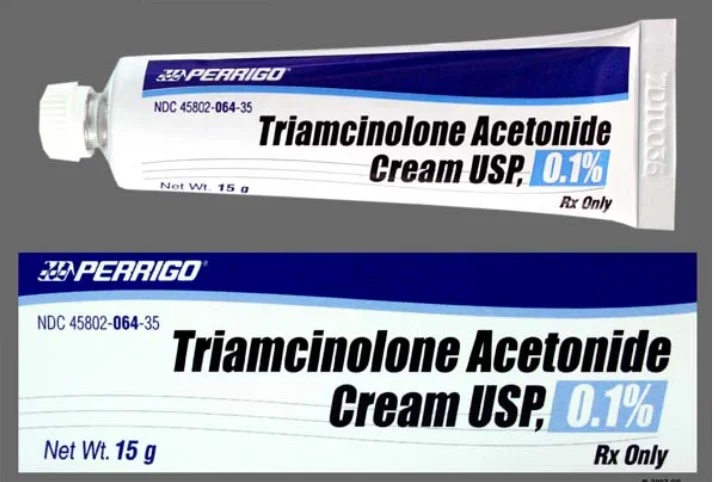 Triamcinolone Acetonide Cream 0.1%
Triamcinolone Acetonide Cream 0.1%
Triamcinolone Acetonide Cream 0.1% is a highly effective veterinary topical treatment designed to manage and alleviate various inflammatory skin conditions in pets, such as eczema, dermatitis, and allergic reactions. Its potent anti-inflammatory properties help reduce swelling, itching, and redness, providing rapid relief and improving your pet's comfort and quality of life.
Key Benefits of Triamcinolone Acetonide Cream
-
Anti-inflammatory Action: Triamcinolone Acetonide Cream 0.1% effectively reduces inflammation, providing relief from swelling and discomfort associated with various skin conditions in pets.
-
Itch Relief: The cream soothes itchy skin, helping to prevent scratching and further irritation.
-
Redness Reduction: It calms and reduces redness, promoting healthier skin.
-
Versatile Use: Suitable for treating eczema, dermatitis, and allergic reactions.
-
Fast-acting: Provides rapid relief, enhancing your pet's comfort and well-being.
Triamcinolone Acetonide Cream 0.1% - Ingredients
Triamcinolone Acetonide Cream 0.1% contains the following ingredients:
-
Purified Water
-
Cetyl Alcohol
-
Stearyl Alcohol
-
Mineral Oil
-
PEG-100 Stearate
-
Polysorbate 60
This combination of ingredients ensures the cream's stability, consistency, and effectiveness in treating various skin conditions in pets.
Prescription items are NON-RETURNABLE and NON-REFUNDABLE.
NOTE: For generic medications, picture displayed may not depict actual product. Manufacturer may vary.
Usage Instructions
-
Application: Gently apply a thin layer of Triamcinolone Acetonide Cream 0.1% to the affected area 2-4 times daily, or as prescribed by your veterinarian. Ensure the area is clean and dry before application.
-
Precautions:
-
Avoid contact with eyes and mucous membranes.
-
Do not use on the face, groin, or underarms unless directed by a veterinarian.
-
Wash hands thoroughly after each application to prevent inadvertent spread to other areas.
Storage
- Store at room temperature, away from moisture and direct sunlight.
- Keep out of reach of children and pets.
Side Effects
- Mild burning,
- Itching, or irritation at the application site.
These effects are usually temporary and subside as the body adjusts to the medication.
Severe Side Effects:
Rarely, the cream may cause
-
Skin Thinning,
-
Discoloration, or
-
Increased Hair Growth.
If any severe side effects occur, discontinue use and consult your veterinarian immediately.
Shipping & Returns
- Shipping Policy: We offer all types of shipping options (Ground, Express, Priority, International) depending on the urgency of the product requirements. To know about our shipping policy in detail,
- Refund policy: If you face any issue with our product and want to return it, read our carefully.
FAQs - Triamcinolone Acetonide Cream
1. Can Triamcinolone Acetonide Cream be used for cats and dogs?
Answer: Yes, Triamcinolone Acetonide Cream 0.1% can be used for both cats and dogs. Always consult your veterinarian for the appropriate dosage and application instructions for your specific pet to ensure safe and effective use.
2. What should I do if my pet licks the cream?
Answer: If your pet licks the cream, monitor them for any adverse reactions. Try using pet collar to prevent licking. Contact your veterinarian for further advice and to ensure your pet's safety.
3. How long does it take to see results with Triamcinolone Acetonide Cream?
Answer: Improvement in skin conditions is typically seen within a few days of consistent application. For best results, follow your veterinarian’s instructions and complete the full course of treatment.
4. Are there any long-term side effects of using Triamcinolone Acetonide Cream on pets?
Answer: Long-term use can lead to side effects like skin thinning or hormonal imbalances. Use only as directed by a veterinarian to minimize risks and ensure it is appropriate for chronic conditions.
5. Can Triamcinolone Acetonide Cream be used with other medications?
Answer: Generally, Triamcinolone Acetonide Cream can be used with other medications, but it's crucial to inform your veterinarian about all the medications your pet is taking to avoid any potential interactions.

